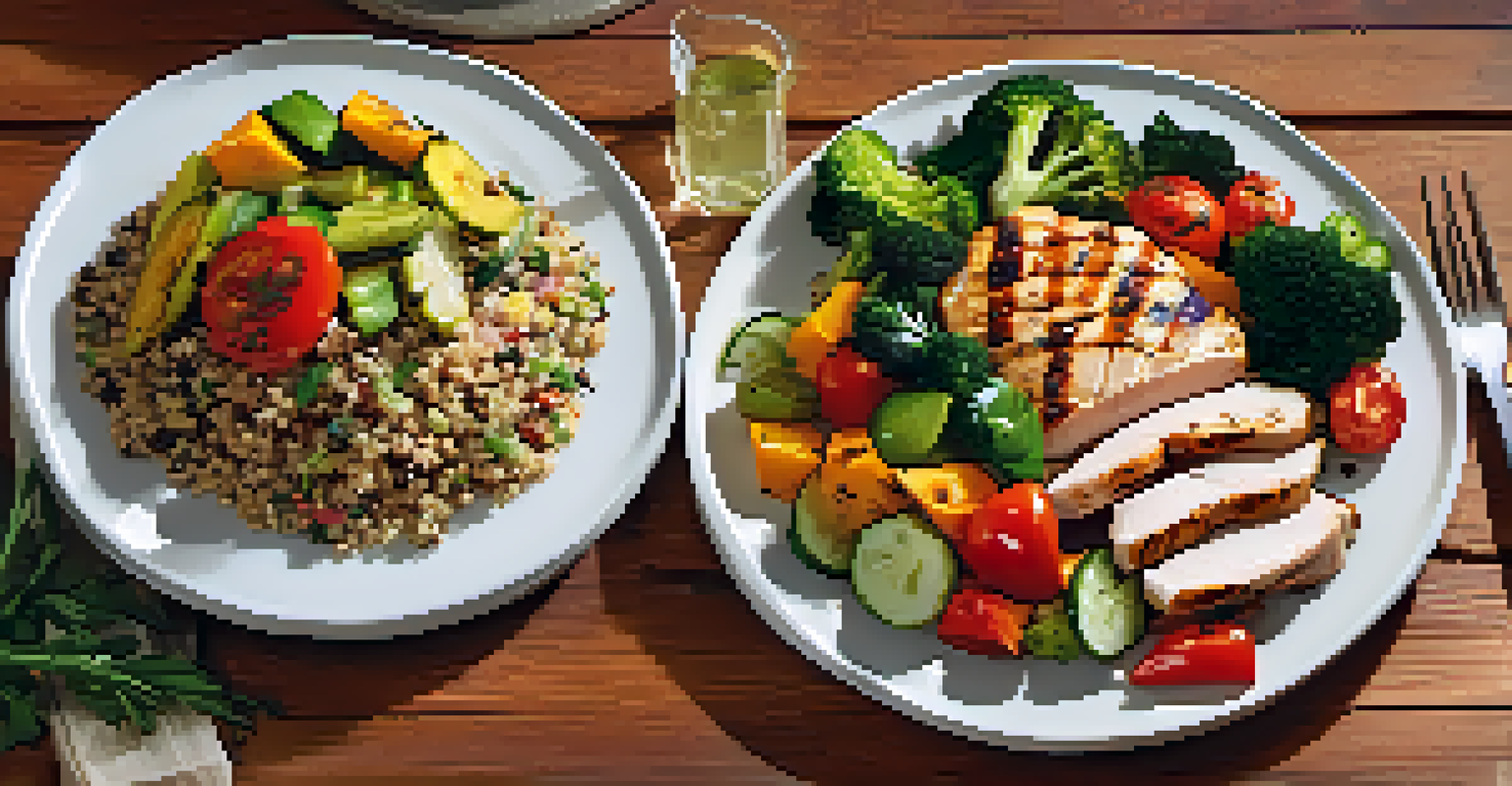Effects of Nutrition on Powerlifting Performance and Gains

Understanding the Basics of Powerlifting Nutrition
Nutrition is the cornerstone of any powerlifting regimen. Just like a car needs the right fuel to run efficiently, your body requires specific nutrients to perform at its best. This means understanding macronutrients—proteins, fats, and carbohydrates—and how they contribute to muscle repair and energy production.
Nutrition is not just about what you eat, it's about how it fuels your performance and recovery.
For powerlifters, protein is particularly vital, as it helps in muscle recovery and growth after those intense lifting sessions. Carbohydrates serve as your primary energy source, fueling your workouts and ensuring you have the stamina to lift heavy weights. Fats, while often misunderstood, play a crucial role in hormone production and overall health.
By grasping these basics, you can create a nutrition plan tailored to your powerlifting goals. This foundation sets the stage for more advanced strategies that can enhance your performance and results.
The Role of Macronutrients in Strength Training
Each macronutrient plays a unique role in enhancing strength training outcomes. Proteins are essential for repairing and building muscle tissue, which is crucial after heavy lifting. A common guideline is to consume approximately 1.6 to 2.2 grams of protein per kilogram of body weight, depending on your training intensity and goals.

Carbohydrates are not just for energy; they also help replenish glycogen stores in your muscles, allowing you to train harder and recover faster. Including complex carbs like whole grains, fruits, and vegetables in your diet will provide sustained energy levels throughout your workouts.
Nutrition Fuels Powerlifting Success
Understanding and optimizing macronutrients is essential for enhancing strength and performance in powerlifting.
Finally, don’t overlook healthy fats—think avocados, nuts, and olive oil. These fats are vital for hormone regulation, including testosterone, which is important for muscle growth and strength.
Hydration: A Key Component of Powerlifting Nutrition
Staying hydrated is often the most overlooked aspect of nutrition, yet it is crucial for powerlifters. Dehydration can lead to fatigue, decrease performance, and even increase the risk of injury. Powerlifting places immense stress on the body, and adequate hydration supports overall function and recovery.
You are what you eat, so don’t be fast, cheap, easy, or fake.
The general recommendation is to drink water throughout the day, but you may need more on training days. A good benchmark is to aim for half your body weight in ounces of water daily, adjusting based on activity level and climate conditions.
Additionally, consider incorporating electrolyte-rich beverages—especially during intense training sessions. This will help maintain your performance levels and prevent cramping, ultimately enhancing your lifting experience.
Meal Timing: When to Eat for Optimal Performance
Meal timing is a strategic aspect of nutrition that can significantly influence your powerlifting performance. Consuming a balanced meal rich in carbohydrates and protein about 2-3 hours before training provides the fuel your muscles need. This pre-workout meal can set the tone for a productive lifting session.
Post-workout nutrition is equally important. Aim to consume a meal or snack containing protein and carbohydrates within 30-60 minutes after training. This window is crucial for muscle recovery and replenishing glycogen stores, which can enhance your strength gains over time.
Hydration Supports Performance
Staying well-hydrated is crucial for powerlifters, as it directly impacts energy levels and recovery.
By mastering meal timing, you can optimize your energy levels and recovery, allowing your body to perform at its best when it counts the most.
Supplements: Do They Really Help Powerlifters?
The world of supplements can be overwhelming, but they can play a supportive role in your powerlifting journey. While whole foods should always be your primary source of nutrients, certain supplements like protein powder, creatine, and branched-chain amino acids (BCAAs) can enhance your performance and recovery.
Creatine, for example, is known to improve strength and power output during high-intensity training. It helps replenish ATP, the energy currency of our cells, allowing you to lift heavier weights more efficiently. Meanwhile, protein powder offers a convenient way to meet your daily protein needs, especially post-workout.
However, it's essential to approach supplements with caution. Not all products are created equal, so do your research and choose high-quality options to support your nutrition plan.
The Impact of Nutrition on Recovery and Gains
Recovery is where the magic happens—it's when your muscles rebuild and grow stronger. Proper nutrition plays a pivotal role in this process. Consuming sufficient protein and calories ensures that your body has the resources it needs for muscle repair and growth.
In addition to protein, don’t underestimate the power of micronutrients. Vitamins and minerals found in fruits and vegetables support various bodily functions, including recovery and immune health. A well-rounded diet rich in these nutrients can reduce recovery time and enhance overall performance.
Personalized Nutrition Is Key
Listening to your body and tailoring your nutrition plan to individual needs can significantly improve powerlifting results.
Ultimately, a focus on nutrition leads to better recovery, allowing you to train harder, lift heavier, and achieve your powerlifting goals more effectively.
Listening to Your Body: A Personalized Approach
Every lifter is different, and what works for one may not work for another. This is why listening to your body and adjusting your nutrition plan accordingly is so important. Pay attention to how you feel during and after workouts, and adjust your food intake to optimize your performance.
Are you feeling fatigued? You may need more carbohydrates. Struggling to recover? Consider increasing your protein intake or adjusting your meal timing. Tracking your food intake and performance can help identify patterns and make informed adjustments.

In essence, a personalized nutrition approach allows you to tailor your diet to your unique needs, ultimately enhancing your powerlifting experience and results.